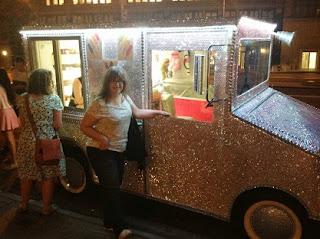 I was very fortunate to receive free tickets to New York Theatre Workshop's production of Fetch Clay, Make Man, by Will Power. I was also very fortunate that a handsome pal was available to join me. I remember reading about this show when it played at the McCarter a few years ago and thought it sounded fascinating. As I believe I've mentioned before, I come from a sports-viewing family, so I've been watching Muhammad Ali for practically my whole life. To see a play that deals with ideas from such an incendiary part of Ali's life and career was very appealing to me. I'll admit I hadn't seen any of playwright Will Power's work before going into last night's show, but I was aware of his previous success around NY.
I was very fortunate to receive free tickets to New York Theatre Workshop's production of Fetch Clay, Make Man, by Will Power. I was also very fortunate that a handsome pal was available to join me. I remember reading about this show when it played at the McCarter a few years ago and thought it sounded fascinating. As I believe I've mentioned before, I come from a sports-viewing family, so I've been watching Muhammad Ali for practically my whole life. To see a play that deals with ideas from such an incendiary part of Ali's life and career was very appealing to me. I'll admit I hadn't seen any of playwright Will Power's work before going into last night's show, but I was aware of his previous success around NY. It's bold to take two such iconic figures in African-American history and see how they fit together - I can't even imagine wrapping my brain around seeing a photograph of Muhammad Ali and the 30s film actor Stepin Fetchit together, but the playwright did see such a photo. And from that photo, and a broad imagination, came this enjoyable exploration on how they possibly came together in 1965, before Ali's second fight with Sonny Liston. There is definitely boldness here.
It's bold to take two such iconic figures in African-American history and see how they fit together - I can't even imagine wrapping my brain around seeing a photograph of Muhammad Ali and the 30s film actor Stepin Fetchit together, but the playwright did see such a photo. And from that photo, and a broad imagination, came this enjoyable exploration on how they possibly came together in 1965, before Ali's second fight with Sonny Liston. There is definitely boldness here.
I did enjoy myself - the production is extremely well-acted, directed and designed, and there's a lot of humor and sharp, provocative dialogue throughout. But to be honest, I was left vaguely unsatisfied, and I'm not quite sure why. I'm really struggling about it - I wanted to love this play because it was inherently so interesting to me. But I didn't love it. I liked it. Perhaps I didn't love it because there are so many subplots, which although they all dealt tangentially with the main relationship between Ali and 'Step', they just seemed to add busywork instead of more layers to the main story. Perhaps it's because I'm not quite sure what I was supposed to take from the piece. Perhaps I was looking for something that just wasn't meant to be there.
 I thought K Todd Freeman was spectacular as Stepin Fetchit, a man trying to pull himself out of obscurity by hitching his wagon to the ascending star that was Muhammad Ali. He does brief snippets of Fetchit's old vaudeville routines and they're wonderfully juxtaposed with the bitter, articulate man he is in the scenes with Ali. I was tremendously moved by his performance in the press conference scene - after it was over, I wished I had been moved more throughout. The inherent pathos should've taken me all the way and it didn't. [all the production shots are from New York Theatre Workshop's website - they were taken by Joan Marcus. my standard disclaimer applies.]
I thought K Todd Freeman was spectacular as Stepin Fetchit, a man trying to pull himself out of obscurity by hitching his wagon to the ascending star that was Muhammad Ali. He does brief snippets of Fetchit's old vaudeville routines and they're wonderfully juxtaposed with the bitter, articulate man he is in the scenes with Ali. I was tremendously moved by his performance in the press conference scene - after it was over, I wished I had been moved more throughout. The inherent pathos should've taken me all the way and it didn't. [all the production shots are from New York Theatre Workshop's website - they were taken by Joan Marcus. my standard disclaimer applies.] It can't have been easy to find a tall, strong, attractive young man, who looks and sounds like Muhammad Ali, and is also a good actor, but they found him in Ray Fisher. I thought he was charming and captured the bravado of the young Ali, and I could see now and then how maybe his naivete about his real life contrasted with his visions of his career, versus Fetchit's naivete about his career but no illusions about his real life. Maybe if that had been explored even more, without so many other subplots, I might've been more completely engaged throughout.
It can't have been easy to find a tall, strong, attractive young man, who looks and sounds like Muhammad Ali, and is also a good actor, but they found him in Ray Fisher. I thought he was charming and captured the bravado of the young Ali, and I could see now and then how maybe his naivete about his real life contrasted with his visions of his career, versus Fetchit's naivete about his career but no illusions about his real life. Maybe if that had been explored even more, without so many other subplots, I might've been more completely engaged throughout.
Richard Masur was terrific as the head of Fox Studios, and one of Fetchit's earliest champions, but his scenes felt shoehorned in. Although it was interesting to see how Fetchit manipulated the movie studio system, it still became a stretch (and distraction) to see how Fox tried to equate his struggle out of poverty to Fetchit's life as an African-American man in America. Nikki M James was wonderful as Sonji, Ali's first wife, chafing at the restrictions of being the wife of the new star of Nation of Islam. Her struggle was also interesting, but perhaps also distracting.
John Earl Jelks was fantastic as a Nation of Islam devotee assigned to protect Ali. The subplot of how his character tried to recruit Fetchit was interesting, but again, maybe distracting to (what I think was) the main story. It's as if there are three or four really interesting plays in here, sort of jumbled into one. I would've enjoyed a piece just about Stepin Fetchit outwitting Hollywood, then losing everything, or a play about how Ali was manipulated by the Nation of Islam, or a play about Ali the man vs Ali the legend. I don't know. Still struggling. I guess it's a good dilemma to have - maybe I'm so frustrated because so much of this play was terrific. The press conference scene, as I mentioned before, was great, as was a scene where Ali and Fetchit are talking about making a movie together. When the characters actually made a dramatic connection, there was the good stuff. A lot of the time, though, it just seemed as if things happened just because the plot dictated it. Does that even make sense? This blog post is pretty jumbled itself. Sorry. Maybe I should just stop and leave it at I loved the acting and the physical production, the idea of the piece, and enough of the script itself to say "you should go."
Just a brief seat neighbor report - actually, a house fly report. There was a GINORMOUS fly in the theater and it drove me INSANE. At one point, I had to shoo it off my face. I told my handsome friend that the house manager should assign the ushers to killing it before the second act. Hmmmmm. Maybe they did. I don't remember seeing it during the second act. Hmmmmmmm.
 Oh, and on our way to the subway, we passed a very strange food truck, but it didn't seem to have food in it. It was, however, completely bedazzled and played a tinkly little tune. It looked like it was selling headbands, stuffed animals and anime merchandise, but I don't know. But I do love a bedazzled not-food-truck. And, then, I had to get one more photo before the end of the night. Most of the day, I could forget what day it was yesterday, but seeing the lights brought it back again. I went home and watched too many 9/11 special reports. Maybe some day I'll do a 9/11 post. Something to think about.
Oh, and on our way to the subway, we passed a very strange food truck, but it didn't seem to have food in it. It was, however, completely bedazzled and played a tinkly little tune. It looked like it was selling headbands, stuffed animals and anime merchandise, but I don't know. But I do love a bedazzled not-food-truck. And, then, I had to get one more photo before the end of the night. Most of the day, I could forget what day it was yesterday, but seeing the lights brought it back again. I went home and watched too many 9/11 special reports. Maybe some day I'll do a 9/11 post. Something to think about.


No comments:
Post a Comment